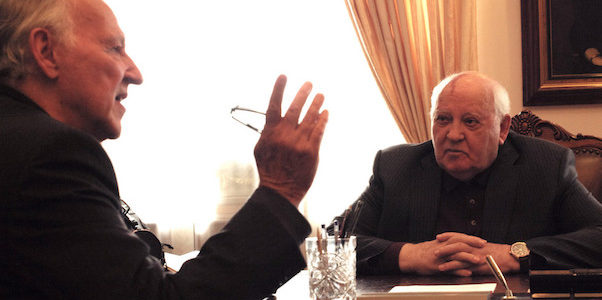
ReelBob: ‘Meeting Gorbachev’ ★★★½
By Bob Bloom
From the outset, it is obvious that filmmaker Werner Herzog admires former president of the Soviet Union Mikhail Gorbachev.
The documentary, “Meeting Gorbachev,” is a sit-down interview in which Herzog lobs questions at Gorbachev.
Throughout the movie, Herzog indicates he is more interested in Gorbachev the man, rather than the politician or the leader.
His questions are not about events, dates or people, but about how decisions Gorbachev made throughout his life led him to the pinnacle of the Soviet hierarchy.
Herzog has such a disarming manner of posing his questions that Gorbachev answers candidly and — at times — in detail.
The filmmaker is very deferential to Gorbachev, which is one of the movie’s weaknesses — and yet, one of its strengths.
Herzog rarely confronts Gorbachev. Instead, he gently probes, querying about the former leader’s influences and regrets.
Interspersed within the interview is archival newsreel footage and TV reports that examine the post-World War II Soviet Union.
It is through most of these old clips that Herzog is able to — with the aid of Gorbachev — describe the dysfunction of the Soviet Union and how a young Gorbachev was able to steadily rise through the ranks of the Communist Party.
Gorbachev was one of the few Soviet officials who traveled throughout the U.S.S.R., connecting with the people — especially the peasants who worked the farms — learning their needs and listening to their complaints.
He also traveled extensively, learning about techniques other nations — Communist and not — used to improve production of food supplies — animal, fruit and vegetable.
His efforts earned him recognition from the Communist Party hierarchy and, as the elderly, hard-line leaders of the party and the government began dying off in quick succession, Gorbachev continued his ascent.
In 1985, he was named General Secretary of the governing Communist Party, and from that position, soon attained the presidency.
Gorbachev saw the flaws in the communist system and wanted to slowly transform the nation into a socialist democracy.
Gorbachev tells Herzog that among his proudest accomplishments is the policy of “perestroika,” a series of reforms to restructure the economy and society. He also instituted a policy of “glasnost,” which was aimed at offering more transparency in government.
He considers the treaty he and President Ronald Reagan crafted and signed, which began as a process of nuclear disarmament, his greatest accomplishment.
However, the nuclear disaster at Chernobyl was a turning point for Gorbachev and the Soviet Union.
Following that horrific event, a move by toward more openness by the government began.
At the same time, many of the nations in the Soviet sphere in Eastern Europe began pro-democracy marches. In earlier decades, such actions would have brought swift reprisals from Soviet authorities in Moscow — as they did in Hungary in 1956 and Czechoslovakia in 1968.
Gorbachev did not interfere. His decision eventually led to such changes as a new government in Poland, the fall of the Berlin Wall and the reunification of East and West Germany.
Gorbachev, who resigned as president of the Soviet Union in 1991, believes the chaos that followed the rapid dissolution of the Soviet Union created more problems for the world.
He would have rather seen it done in a more orderly and slower manner, in which democratic reforms were incrementally introduced into the various countries within the Soviet bloc.
Herzog gently prods Gorbachev to talk about his late wife, Raisa, who also was his closest adviser and partner and, unlike wives of former Soviet leaders, did not stay in the shadows. His tearful reaction is moving.
“Meeting Gorbachev” portrays the man as a visionary politician who, even today at 87 and in ill health, still pushes for reforms to better the world.
The documentary’s main flaw is that Herzog is too respectful and fails to push Gorbachev to go deeper on certain issues.
Herzog considers Gorbachev one of the greatest and most important politicians of the last half of the 20th century. And the movie — as well as Gorbachev’s words — support his premise.
I am a founding member of the Indiana Film Journalists Association. My reviews appear at ReelBob (reelbob.com) and Rottentomatoes (www.rottentomatoes.com). I also review Blu-rays and DVDs. I can be reached by email at bobbloomjc@gmail.com or on Twitter @ReelBobBloom. Links to my reviews can be found on Facebook, Twitter and LinkedIn.
MEETING GORBACHEV
3½ stars out of 4
Not rated
